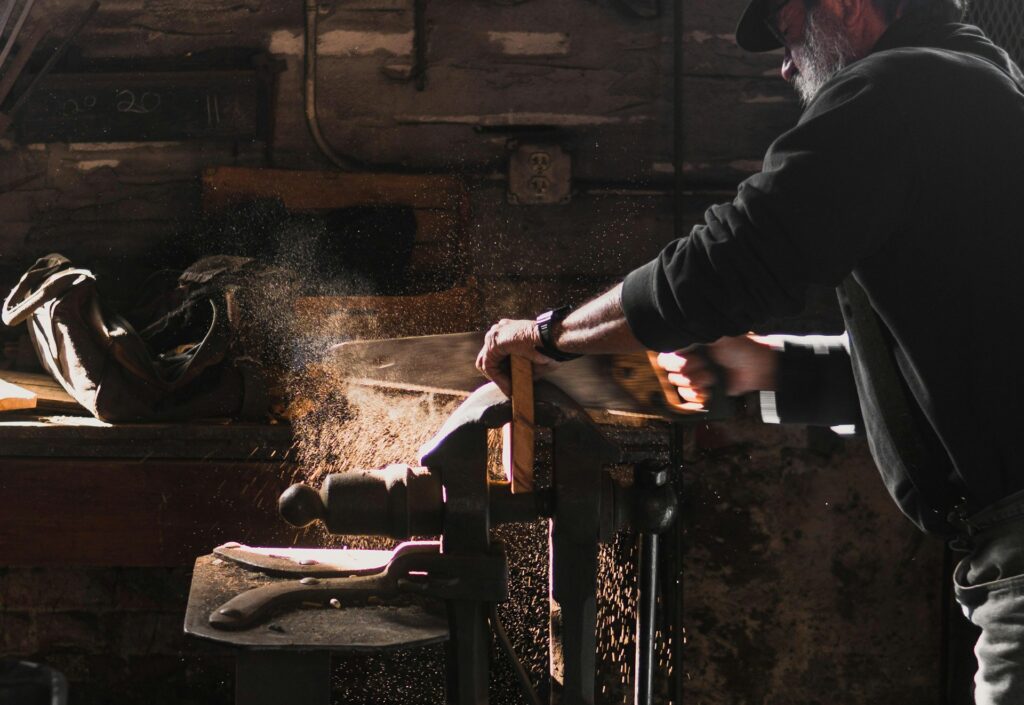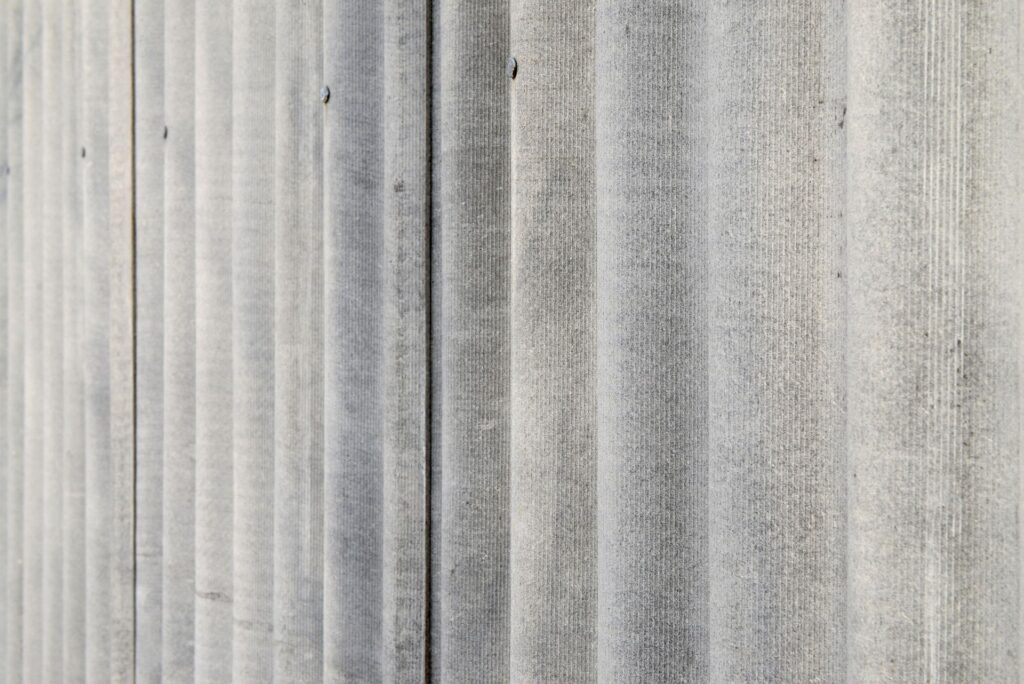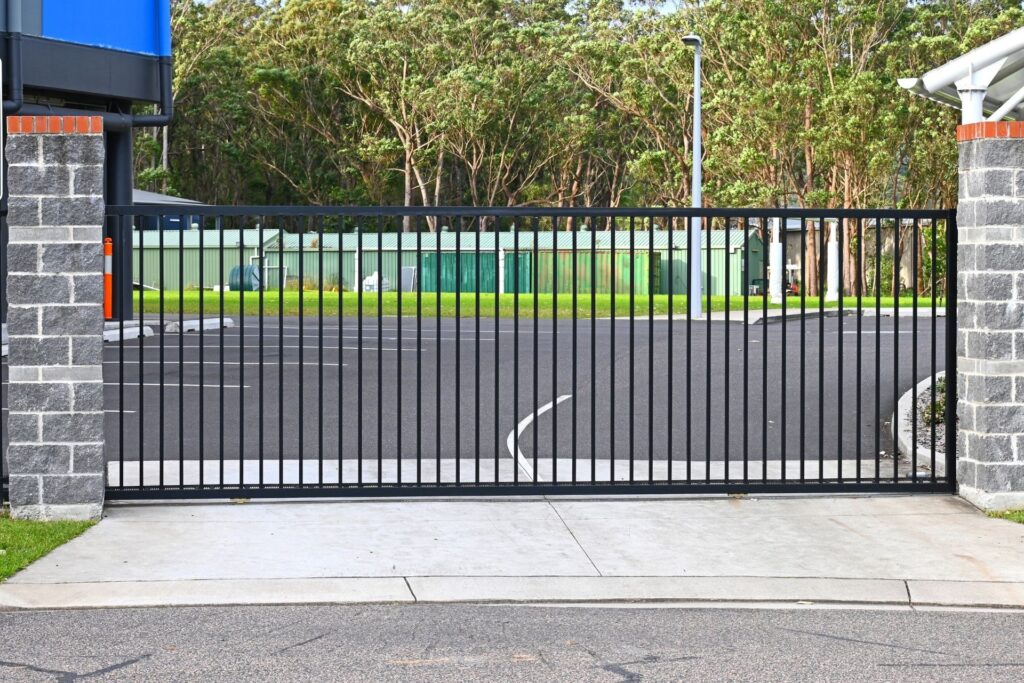Welcome to the ultimate guide on one of the most common debates among homeowners and property developers: are aluminium gates better than wood? If you’re upgrading your property and faced with this decision, you’re not alone. Both materials offer unique advantages, from the sleek modern look and low maintenance of aluminium to the classic charm and natural beauty of wood. In this article, we’ll break down everything you need to know about both options, including durability, cost, maintenance, aesthetics, and more, to help you make an informed decision that suits your home and lifestyle. Let’s dive in and explore which gate material is right for you!
Aluminium gates are generally better than wood gates in terms of durability, low maintenance, and long-term cost-effectiveness. Unlike wood, aluminium is resistant to rust, corrosion, and weather damage, making it a more reliable option for various climates. While wood offers a classic, natural appeal, it requires regular maintenance, such as painting and sealing, to prevent warping or decay. Aluminium gates also provide a modern aesthetic, are highly customizable, and require minimal upkeep, making them a popular choice for homeowners seeking longevity and ease of use.
Table of Contents
Aluminium Gates Vs. Wood Gates: An Overview
When it comes to choosing the perfect gate for your home, both aluminium and wood gates offer their own unique appeal. The decision often boils down to the style, functionality, and durability you are looking for. In this guide, we’ll break down the key differences between aluminium and wood gates to help you make an informed choice that complements your property’s aesthetic and meets your practical needs.
Aluminium Gates: Modern and Durable
What are Aluminium Gates Made Of?
Aluminium gates are typically constructed from high-quality aluminium alloys. These materials are favored for their lightweight yet sturdy nature. The two primary types of aluminium used in gates are cast aluminium and extruded aluminium. Cast aluminium is strong and provides excellent durability, while extruded aluminium allows for sleek, modern designs. The material’s natural resistance to corrosion is a key reason why aluminium gates have surged in popularity.
Why Choose Aluminium Gates?
One of the standout features of aluminium gates is their lightweight nature. This makes them easier to install and operate compared to heavier materials like steel or wood. Additionally, aluminium gates come in a variety of modern designs, often featuring clean lines and contemporary aesthetics that appeal to homeowners looking for a sleek and stylish appearance. Moreover, their low-maintenance requirements add to their popularity, as they don’t warp or rot over time, unlike wood.
Wooden Gates: Timeless and Traditional
Types of Wood Used in Gates
Wooden gates have been a long-standing favorite due to their natural beauty and traditional charm. They are usually crafted from two main categories of wood: hardwood and softwood. Hardwood varieties like oak and teak are known for their durability and resistance to weather elements, making them suitable for outdoor use. Softwoods such as pine or cedar, while more affordable, may require more frequent maintenance and treatments to ensure longevity.
The Classic Appeal of Wooden Gates
Wooden gates bring a warm, rustic aesthetic to any property. Their natural grain and texture can add character and charm, especially to homes with traditional or country-style designs. For those who appreciate a classic or heritage look, wooden gates are an ideal choice. They are highly customizable, allowing homeowners to stain or paint them in any color to match their home’s exterior.
General Comparison: Aluminium vs. Wood Gates
Style: Modern vs. Traditional
When it comes to style, aluminium gates tend to lean toward a more modern, sleek, and minimalist aesthetic. They are perfect for contemporary homes looking to make a stylish statement with a cutting-edge design. On the other hand, wooden gates offer a traditional, rustic appeal, making them well-suited for properties that aim to convey warmth, charm, and a more natural look.
Durability and Maintenance
Aluminium gates are inherently more durable when it comes to resisting environmental damage. They don’t rust, warp, or rot, which makes them a low-maintenance option that can withstand varying weather conditions without deteriorating. Wooden gates, while beautiful, require regular maintenance such as painting, staining, and treatments to prevent issues like rotting, warping, and termite damage. However, hardwood gates, in particular, can offer substantial durability when properly cared for.
Weight and Installation
Another key difference is the weight of the materials. Aluminium gates are much lighter compared to wooden gates, which makes them easier to handle and install. The lightweight nature also means less strain on gate motors if you opt for automatic gates. Wooden gates, being denser and heavier, can require more robust installation methods, particularly if they are made from solid hardwood.
Cost and Value
Aluminium gates generally offer a more affordable option in terms of both upfront costs and long-term value. Their durability and low maintenance make them a cost-effective investment over time. Wooden gates, especially those made from high-quality hardwoods, can be more expensive to purchase and maintain, but they add significant value in terms of aesthetics and classic appeal.
Environmental Impact
From an environmental perspective, both materials have their advantages. Aluminium is a recyclable material, making it a more sustainable choice. Wood, on the other hand, is a natural resource, and if sourced responsibly, can also be eco-friendly. However, the need for chemical treatments and paints for wood maintenance can increase its environmental footprint over time.
Choosing between aluminium and wooden gates depends largely on your style preference and how much maintenance you’re willing to undertake. If you’re looking for a modern, low-maintenance, and durable option, aluminium gates may be the best fit. However, if you prefer the timeless beauty and traditional appeal of natural wood, and don’t mind regular upkeep, wooden gates could be the ideal choice for your property. Both materials have their own unique set of advantages, so your decision should align with your personal taste, budget, and the specific needs of your home.

Durability And Longevity
When selecting the right gate for your property, two of the most popular options are aluminium and wooden gates. Each material comes with its unique strengths and weaknesses, particularly when it comes to durability and longevity. Let’s take a closer look at how these materials compare over time, factoring in elements like climate, maintenance, and wear and tear.
Aluminium Gates: Built to Last
Strength
One of the key advantages of aluminium gates is their inherent resistance to rust and corrosion. This makes aluminium an excellent choice for properties in various climates, especially those in coastal or humid areas where moisture is abundant. Unlike other metals, aluminium won’t rust or degrade when exposed to rain or salty air, ensuring that your gate remains strong and structurally sound for many years.
Wear and Tear
Aluminium gates are engineered to resist the common issues that plague other materials. They don’t warp, crack, or split under pressure, whether from temperature changes or physical impact. This means you won’t have to worry about your gate becoming misshapen or damaged over time. The material is lightweight yet robust, allowing it to withstand daily use and exposure to the elements without losing its form or functionality.
Lifespan
With minimal maintenance, aluminium gates can last for decades. Routine cleaning and occasional touch-ups are generally all that’s required to keep them looking fresh. Even after many years of exposure to harsh weather conditions, aluminium gates show little sign of degradation, making them a long-term investment that provides great value for homeowners seeking both durability and aesthetics.
Wooden Gates: Natural Beauty with Extra Care
Strength
Wooden gates, especially those made from hardwoods like oak or teak, can be incredibly strong. However, wood is naturally more vulnerable to the elements than aluminium. Moisture, temperature changes, and pests like termites can compromise the integrity of wooden gates. Without proper treatment, wood can become susceptible to rot, decay, and insect damage. While hardwood gates offer greater resistance, softwoods are more prone to these issues.
Maintenance Needs
To keep wooden gates in good condition, regular maintenance is essential. Over time, wood can warp, crack, or split, especially if exposed to extreme weather conditions or if not properly sealed and treated. Homeowners will need to commit to periodic tasks such as painting, sealing, or staining to protect the wood from moisture and UV damage. This ongoing upkeep can be time-consuming and costly but is necessary to preserve the gate’s appearance and functionality.
Lifespan
While wooden gates can last a long time, especially when made from high-quality hardwood and maintained regularly, they typically don’t have the same lifespan as aluminium. Without consistent care, a wooden gate may start to show signs of wear and degradation within a few years, particularly in harsh weather conditions. However, with diligent upkeep, some hardwood gates can last for decades, though they will still require more attention than aluminium.
When it comes to durability and longevity, aluminium gates generally outperform wooden ones, especially in extreme weather conditions or areas prone to moisture and corrosion. Aluminium’s resistance to rust, its lightweight yet sturdy nature, and its minimal maintenance requirements make it an excellent long-term investment for homeowners who value durability. On the other hand, wooden gates, while offering natural beauty and aesthetic appeal, come with the added responsibility of regular maintenance and care to ensure they last as long as possible. For those who prioritize longevity with minimal upkeep, aluminium is the clear choice, while wood may still appeal to those who appreciate its timeless, natural look despite the extra effort required.

Aesthetics: Modern Vs. Classic Appeal
When choosing a gate for your home, aesthetics play a crucial role in complementing the overall architectural style. The choice between aluminium and wooden gates comes down to a balance between modern and classic appeal. Each material has distinct advantages in design, customization, and overall appearance, making it important to understand the differences to find the perfect match for your home.
Aluminium Gates: A Modern Marvel
- Design Versatility: One of the standout features of aluminium gates is their incredible design flexibility. Aluminium can be crafted to mimic the look of wood, offering the appearance of a natural material with the durability and low maintenance of metal. Whether you’re aiming for sleek, contemporary designs or traditional aesthetics, aluminium offers a wide range of finishes and styles. Powder-coating adds another layer of protection while allowing for a variety of colors, enabling homeowners to find the perfect match for their exterior.
- Modern Look: Aluminium gates exude a clean, minimalistic look that is ideal for modern homes. With smooth surfaces and simple lines, aluminium perfectly suits properties that embrace contemporary architecture. This material is often chosen for its ability to maintain a fresh, polished appearance over time, enhancing the curb appeal of modern homes with its sharp, sophisticated look.
- Customization: Aluminium offers exceptional customization options. From intricate patterns to unique shapes and finishes, it’s easy to tailor an aluminium gate to your specific tastes. Whether you want geometric patterns for a cutting-edge look or more subtle, understated designs, aluminium allows for high levels of personalization, making it a favorite among those seeking a modern, tailored aesthetic.
Wooden Gates: Timeless Charm
- Classic Beauty: Wooden gates are synonymous with classic elegance. Wood offers a natural, timeless beauty that is difficult to replicate with synthetic materials. Its rich texture and organic feel make it the perfect complement to traditional, rustic, or countryside homes. For homeowners seeking a more traditional or warm ambiance, wooden gates add a level of authenticity and charm that’s hard to beat.
- Natural Feel: Wood brings a sense of warmth and earthiness to any home. Unlike metal, which can sometimes feel cold or industrial, wood evokes a more welcoming, natural vibe. This makes wooden gates a great option for homes that aim to harmonize with their natural surroundings, whether it’s a lush garden or a rural landscape.
- Variety of Wood Types: One of the key benefits of wooden gates is the variety of wood types available. From cedar to oak to pine, each wood species offers its unique aesthetic qualities. Additionally, wood can be stained or painted to match your home’s color scheme, providing endless customization possibilities. This versatility allows wooden gates to suit a wide range of tastes and design preferences, from rustic and antique to more polished and modern looks.
When it comes to aesthetics, choosing between aluminium and wooden gates ultimately depends on your personal style and the architectural design of your home. Aluminium gates are perfect for homeowners seeking a modern, sleek, and highly customizable option. On the other hand, wooden gates offer a timeless, natural charm that blends seamlessly with more traditional or rustic settings. Whether you lean towards the contemporary elegance of aluminium or the classic beauty of wood, both materials offer unique aesthetic benefits that can elevate the look and feel of your home.

Maintenance Requirements
When considering gates for your property, understanding the maintenance requirements is key to making the right choice. Let’s dive into the specifics of aluminium and wooden gates, two popular options that differ significantly in terms of upkeep. This section provides an in-depth look at the maintenance demands of each material, helping you decide which suits your lifestyle and long-term needs.
Aluminium Gates: A Low-Maintenance Solution
1. Virtually Maintenance-Free
Aluminium gates are known for being one of the easiest materials to care for. Unlike other gate materials, aluminium doesn’t rust or corrode over time, which means there’s no need for constant upkeep to prevent deterioration. One of the major advantages is that aluminium gates don’t require regular painting, staining, or sealing. A simple wash with soap and water every now and then is all you need to keep them looking pristine. This makes them an excellent choice for homeowners who want a gate that’s stylish yet hassle-free.
2. Weather Resistant
Aluminium gates are highly resistant to various weather conditions. Whether you’re dealing with heavy rain, snow, or intense sunlight, aluminium can withstand the elements without losing its structural integrity. Its natural resistance to corrosion makes it an ideal option for humid or coastal areas where salt air can quickly degrade other materials. The durability of aluminium ensures that it will maintain its appearance and functionality for years to come, with minimal intervention required.
Wooden Gates: High-Maintenance but Classic
1. Regular Sealing, Painting, or Staining
Wooden gates, while undeniably beautiful and classic in appearance, come with a significantly higher maintenance burden compared to aluminium. To keep a wooden gate in good condition, regular treatments are necessary. These include sealing, painting, or staining to protect the wood from environmental factors such as moisture, UV rays, and pests. Without these protective layers, wood is vulnerable to rotting, warping, and discoloration, all of which can compromise the gate’s strength and visual appeal. This kind of upkeep can be time-consuming and costly over the years.
2. Prone to Weather-Related Damage
Wood is susceptible to various types of damage caused by weather. Prolonged exposure to sun, rain, or extreme temperatures can lead to splitting, cracking, or warping. This means that wooden gates often require more frequent repairs or even replacement of damaged parts. Additionally, wood is not naturally resistant to pests, such as termites or wood-boring insects, so treatments may be needed to avoid infestations that could weaken the gate structure.
3. Higher Long-Term Costs
While wooden gates may have a classic, timeless appeal, they come with higher long-term maintenance costs. The expense of wood treatment products, paints, and sealants adds up over time. Plus, the need for repairs or partial replacements can further drive up the cost. These factors make wooden gates a more expensive option in terms of upkeep compared to aluminium, even though their initial purchase price might be comparable.
If ease of maintenance is a top priority for you, aluminium gates are the clear winner. Their low-maintenance nature, weather resistance, and long-lasting durability make them a smart choice for busy homeowners who want a stylish, functional gate without the hassle of frequent repairs and upkeep. While wooden gates offer a beautiful, traditional look, they require more care and investment over time to maintain their appearance and functionality. For those who prefer minimal maintenance and long-term cost savings, aluminium gates are the superior option.
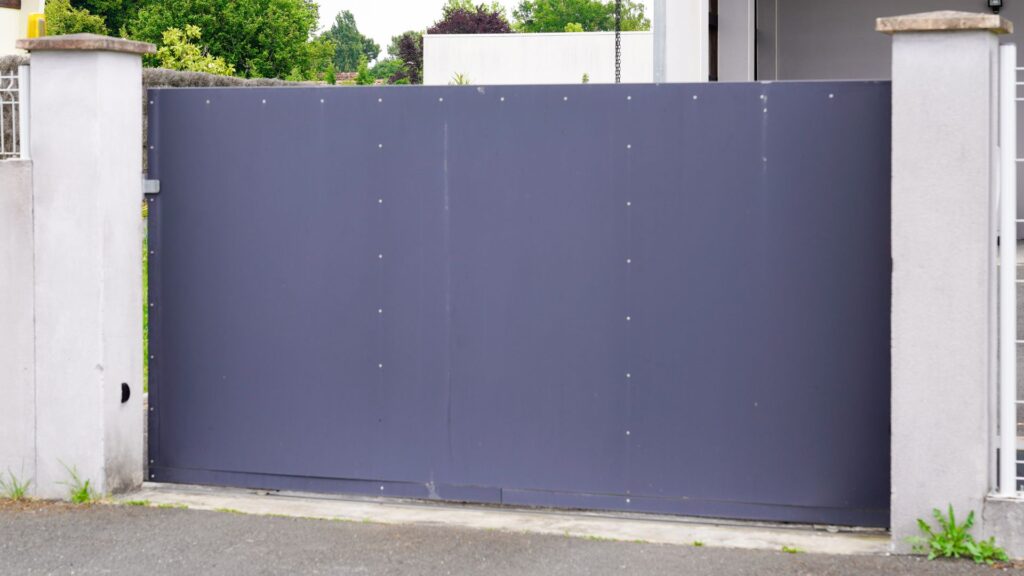
Cost Comparison: Initial Investment And Long-Term Value
When deciding between aluminium and wooden gates, understanding both the initial and long-term costs is crucial. The material you choose will impact your budget not only upfront but also over the years through maintenance and repairs. Here’s a breakdown of how these two popular materials compare in terms of cost:
Initial Costs
Aluminium Gates
Aluminium gates generally come with a higher price tag right from the start. The premium cost is due to the higher expense of the raw materials and the manufacturing process involved in creating durable, sleek aluminium gates. Although the upfront cost is higher, this can be seen as an investment, as the long-term benefits can offset the initial expense.
Wooden Gates
Wooden gates tend to be more affordable initially, particularly when opting for softwoods. However, the price can rise significantly if you choose high-quality, durable woods like hardwoods (e.g., oak or teak). While softwood gates offer a cheaper entry point, hardwood gates can easily rival or even exceed the cost of aluminium gates in some cases.
Long-Term Costs
Aluminium
One of the major advantages of aluminium gates is their low maintenance. Aluminium is naturally resistant to rust and corrosion, and it does not require frequent repainting, sealing, or treatments. This makes the long-term upkeep of aluminium gates minimal, reducing the overall cost of ownership. In addition to being weather-resistant, they are also less likely to warp or rot, ensuring that they remain in good condition for years with very little effort. This makes aluminium a highly cost-effective option in the long run.
Wood
Wooden gates, while initially appealing due to their classic look and sometimes lower upfront cost, tend to require regular maintenance. Wood is susceptible to weathering, rotting, and insect damage, especially in regions with harsh climates. To preserve its aesthetic and structural integrity, wooden gates often need to be painted, sealed, or stained every couple of years. Additionally, repairs may be necessary over time due to warping or splitting, which adds to the lifetime costs. Thus, while wood may save you money at first, the ongoing maintenance can make it a more expensive option over time.
When comparing aluminium and wooden gates, the choice often comes down to initial versus long-term costs. While wooden gates can offer a lower initial cost, especially with softwoods, the need for frequent maintenance and repairs can drive up the total cost of ownership significantly over time. On the other hand, aluminium gates may require a higher initial investment, but their durability and low maintenance requirements make them a more cost-effective choice in the long term. For homeowners looking to reduce long-term expenses, aluminium gates often provide better overall value.

Environmental Impact And Sustainability
When it comes to choosing between aluminium and wooden gates, environmental impact and sustainability are key factors to consider. Each material has its own pros and cons regarding eco-friendliness, from sourcing to long-term maintenance. Let’s explore how these materials measure up in terms of sustainability.
Aluminium Gates
Recyclability
One of the biggest advantages of aluminium is its remarkable recyclability. Unlike many materials that degrade with each recycling cycle, aluminium can be recycled indefinitely without losing its structural integrity. In fact, around 75% of all aluminium ever produced is still in use today. This makes aluminium gates a sustainable choice, as they can be repurposed repeatedly, reducing the need for raw material extraction. Furthermore, recycling aluminium uses only 5% of the energy required to produce it from raw materials, which significantly lowers its carbon footprint in the long run.
Eco-Friendly Manufacturing
While aluminium is highly recyclable, it’s important to note that its initial production does come with a significant environmental cost. Aluminium is made from bauxite ore, and the extraction process, along with the energy-intensive smelting and refining, can result in a high carbon footprint. However, once aluminium is in use, its durability and recyclability make it a more sustainable option over time. Aluminium gates require very little maintenance, which also contributes to their eco-friendliness, as less energy and resources are needed for repairs or replacements.
Wooden Gates
Sustainability of Wood
Wood, as a naturally renewable resource, has long been considered an eco-friendly building material. When sourced responsibly from well-managed forests, it is an excellent choice for environmentally conscious consumers. Many wood suppliers adhere to certifications like the Forest Stewardship Council (FSC), ensuring that the timber comes from sustainably harvested forests. Wooden gates can offer a low carbon footprint, especially if locally sourced, as less energy is required for transportation.
Environmental Impact
However, wood has its own set of environmental concerns. To make wooden gates durable and resistant to pests and rot, they are often treated with chemicals. These chemical treatments, while extending the lifespan of the wood, can introduce harmful substances into the environment. Additionally, untreated wood may require regular maintenance such as staining or sealing, which involves the use of paints or oils that may contain volatile organic compounds (VOCs), contributing to air pollution.
Both aluminium and wooden gates have the potential to be environmentally friendly, but each comes with trade-offs. Aluminium’s high recyclability and low maintenance requirements make it a sustainable option in the long run, despite its initial manufacturing carbon footprint. Wooden gates, on the other hand, are renewable and can be highly eco-friendly if sourced from responsibly managed forests. However, the use of chemicals for wood treatment can diminish its environmental benefits. Ultimately, the choice between aluminium and wood depends on personal preferences and long-term sustainability goals. When responsibly sourced and carefully maintained, both materials can contribute to an eco-friendly home.
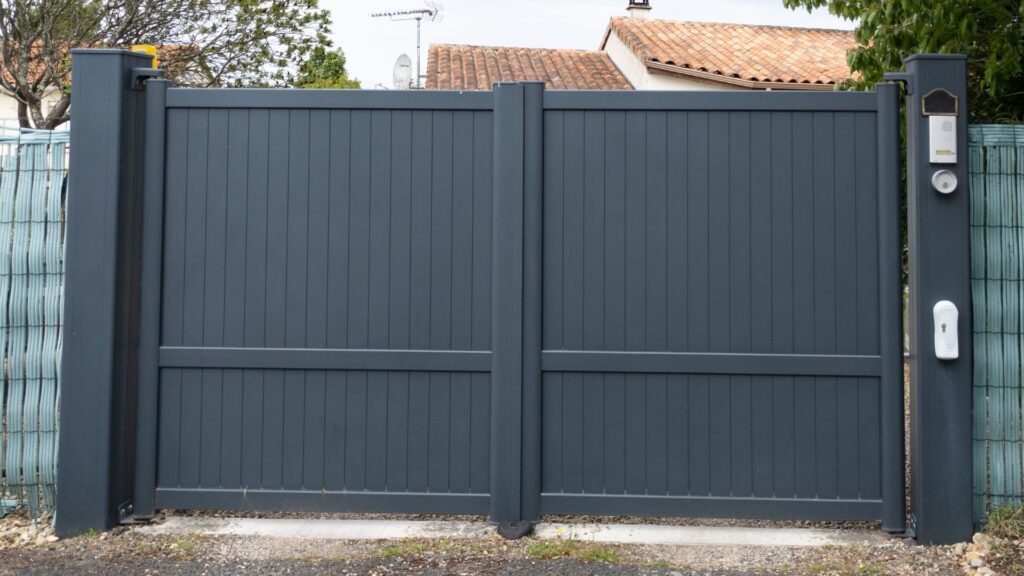
Security And Strength
When choosing between aluminium and wooden gates, security is a crucial factor for any homeowner or business owner. Both materials have their strengths and weaknesses, but understanding the key differences in terms of security and durability can help you make the best choice for your needs.
Aluminium Gates: Strength and Security
Aluminium gates offer an excellent balance of strength and security. Despite being lightweight, aluminium is a highly durable material that can withstand various external forces. This means that while these gates are easier to operate due to their lighter weight, they are by no means easy to breach. In fact, the lightweight nature of aluminium doesn’t compromise its strength—instead, it makes the gates more resistant to impact, which is critical when considering protection against forced entry.
One of the main advantages of aluminium gates is that they often come equipped with advanced locking systems, enhancing their security further. Many modern aluminium gates are designed with technology integration in mind, allowing for features like automatic opening systems, keypads, intercoms, and even security sensors. This integration not only adds an extra layer of protection but also makes controlling access more convenient.
Additionally, aluminium is naturally resistant to corrosion, meaning that over time, it will maintain its structural integrity without the risk of weakening due to rust. This long-lasting strength makes aluminium gates a great choice for maintaining security with minimal ongoing maintenance.
Wooden Gates: Strength and Vulnerabilities
Wooden gates, particularly those made from hardwood, can also be strong and provide a solid level of security. Hardwood gates such as oak or mahogany are dense and durable, giving a robust feel and a strong deterrent to intruders. However, the security strength of wooden gates is somewhat compromised over time due to the material’s natural vulnerabilities.
Wood is susceptible to environmental factors like rot, moisture, and wear, which can weaken the gate’s structural integrity. To maintain a high level of security, wooden gates often require frequent maintenance and reinforcements, such as metal brackets or crossbars. Without proper care, the gate’s ability to withstand impact or attempts at forced entry may decrease over time.
Another important consideration is that wooden gates typically don’t have the same level of integration with modern security technologies as aluminium gates do. While it’s possible to add locks and bolts to a wooden gate, integrating advanced systems such as automatic openers or smart sensors is often more challenging and may require additional investment in custom solutions.
When it comes to long-term security, aluminium gates generally offer superior protection. Their combination of lightweight strength, resistance to environmental damage, and compatibility with advanced security technologies makes them an ideal choice for modern homes and businesses. While wooden gates can provide solid security in the short term, they typically require more maintenance and may not offer the same level of durability or technological integration. For those looking for a low-maintenance, highly secure solution, aluminium is the clear winner in the long run.
By investing in an aluminium gate, you can enjoy the benefits of enhanced security, modern convenience, and long-lasting durability, ensuring your property remains well-protected for years to come.

FAQs: About Are Aluminium Gates Better Than Wood
How long do aluminium gates last compared to wood?
Aluminium gates generally last longer than wooden gates. Aluminium is resistant to rust, corrosion, and weather-related damage, allowing it to remain in good condition for decades with minimal maintenance. Wood, on the other hand, can deteriorate over time due to moisture, pests, and general wear, requiring more frequent upkeep to extend its lifespan.
Can aluminium gates be made to look like wood?
Yes, aluminium gates can be designed to mimic the appearance of wood. Through special powder coatings and finishes, aluminium gates can achieve a wood-like look, offering the natural aesthetic of wood without the high maintenance requirements.
Which gate material is better for extreme climates?
Aluminium is better suited for extreme climates, especially in areas with high humidity, rain, or coastal environments, where wood may warp, rot, or crack. Aluminium gates are resistant to moisture and temperature fluctuations, making them more durable in harsh conditions.
What is the maintenance requirement for aluminium gates compared to wood?
Aluminium gates require very little maintenance, usually just occasional cleaning with water and mild detergent. Wooden gates, on the other hand, need regular sealing, painting, or staining to protect against moisture, UV rays, and pests. Wood is also more prone to repairs due to cracking or rotting over time.
Are aluminium gates more expensive than wood gates?
Aluminium gates tend to have a higher upfront cost than wood gates, but their low maintenance and long lifespan make them more cost-effective in the long run. Wooden gates may be less expensive initially, but they require more upkeep, which can lead to higher long-term costs.
Are aluminium gates as secure as wood gates?
Yes, aluminium gates are very secure. While they are lightweight, they are strong and resistant to impact, making them a good choice for security. Aluminium gates often come with advanced locking mechanisms and can be easily integrated with automated systems for added security.
Which gate material is more environmentally friendly?
Both aluminium and wood have eco-friendly aspects, but it depends on sourcing and disposal. Aluminium is highly recyclable and can be reused indefinitely, making it a sustainable option over time. Wood is a renewable resource, but the sustainability depends on whether the wood is responsibly sourced. Treated wood may also have environmental downsides due to the chemicals used in preservation.
Can wooden gates be customized more easily than aluminium gates?
Both aluminium and wooden gates offer high levels of customization. Wooden gates can be easily shaped and styled with carving, painting, or staining. Aluminium gates, however, can be customized with various designs, patterns, and finishes, including wood-like appearances, making it a versatile option for modern and traditional designs alike.
Which material is better for a modern home aesthetic?*
Aluminium gates are often preferred for modern homes due to their sleek, minimalistic design and versatility. They can be powder-coated in various colors and customized to suit contemporary styles. While wooden gates can also be used for modern aesthetics, they tend to be associated more with traditional or rustic designs.
Do aluminium or wooden gates provide better insulation for noise and privacy?
Wooden gates generally offer better insulation for noise and privacy due to their density and thickness. While aluminium gates can be designed for privacy with solid panels, they are typically lighter and may not block as much sound as a solid wood gate. However, if soundproofing is a top concern, additional insulation options can be incorporated into either material.
Conclusion
When deciding between aluminium and wood for your gate, it’s essential to weigh the benefits of each material based on your needs. Aluminium offers durability, low maintenance, a sleek modern look, and enhanced security, making it an excellent choice for those seeking long-lasting functionality with minimal upkeep. On the other hand, wood provides a timeless, natural aesthetic that appeals to homeowners who appreciate tradition, although it requires more maintenance and may not last as long. Ultimately, the right choice depends on your personal preferences and lifestyle. If you prioritize ease of care and longevity, aluminium may be ideal, but if you’re drawn to a warm, classic design, wood could be your best bet. To learn more about these materials or get expert advice, consider reaching out for personalized recommendations to find the perfect gate for your home.
About the Author:
Mike Veail is a recognized digital marketing expert with over 6 years of experience in helping tradespeople and small businesses thrive online. A former quantity surveyor, Mike combines deep industry knowledge with hands-on expertise in SEO and Google Ads. His marketing strategies are tailored to the specific needs of the trades sector, helping businesses increase visibility and generate more leads through proven, ethical methods.
Mike has successfully partnered with numerous companies, establishing a track record of delivering measurable results. His work has been featured across various platforms that showcase his expertise in lead generation and online marketing for the trades sector.
Learn more about Mike's experience and services at https://theleadguy.online or follow him on social media:


